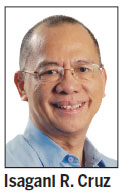Who is a native speaker?
Updated: 2014-07-15 05:27
By Isagani R. Cruz(HK Edition)
|
|||||||||
The Native-Speaking English Teacher (NET) scheme appears to be based on a false assumption that there is such a thing as a native speaker of English.
In his 2003 book, The Native Speaker: Myth and Reality, Alan Davies argues that there is no definition of the term "native speaker" that all, or even most, linguists agree on.
Noam Chomsky, known as "the father of modern linguistics", famously said that a native speaker is in reality "idealized". The native speaker exists only as an ideal, not as a reality. It (not he or she) is really an abstraction that all speakers of English, no matter their domicile or nationality, aspire to.
A linguist almost as famous as Chomsky is Braj Kachru. He believes that there are native speakers of Indian English and native speakers of Singaporean English, just as there are native speakers of British English and American English. There is, in other words, no native speaker of English, because there is no such thing as "English" but only "Englishes."
The NET issue has to do more specifically with the question of the ability of so-called "native speakers", as opposed to so-called "non-native speakers" to teach a language.

Andisheh Saniei, in a 2011 article published in Singapore, observes that "native speakers do not always speak according to the rules of their standard national languages. They display regional, occupational, generational, and social class-related ways of talking that make the notion of an ideal native speaker controversial. Non-native teachers, on the other hand, may be better qualified than native speakers if they have insight into the linguistic and cultural needs of their learners, and have adequate experience of using a second or foreign language. Moreover, on a practical level, it seems more desirable for learners not to be taught the full range of registers and styles of the target language but only those elements that will help them to achieve their learning goals."
As exemplified by recent exchanges among Hong Kong teachers of English, there are sometimes violent arguments about whether monolingual speakers are better than bilingual or multilingual speakers in teaching a language. These arguments, however, are not confined to purely linguistic grounds. More often than not, they are based on vested interests in one's own country, one's lucrative job, or one's personal comfort zone.
As A. Suresh Canagarajah of the City University of New York, in a 2013 article entitled "Interrogating the 'Native Speaker Fallacy': Non-Linguistic Roots, Non-Pedagogical Results", says, "there are hidden economic, ideological, and political motivations that underlie this widespread assumption" that there is such a thing as a native speaker.
From a purely linguistic point of view, monolingual speakers are language-challenged, because any language (not just English or Englishes) is severely limited by the places where its speakers live. Linguists still argue about whether Edward Sapir and Benjamin Lee Whorf went overboard in pointing out that people view reality differently according to the language they speak, but there is clearly a difference between a person who speaks only English and cannot distinguish the different shades of white or the different kinds of rice that speakers of other languages can.
To cite a Philippine example, a sentence that says "May tutongangsinangagnakaninnagalingsabigasmulasapalay" makes perfect sense in Tagalog, but is completely incomprehensible in its English translation of "There is rice in the rice made of rice that comes from rice coming from rice." There are so many words for rice in Philippine languages that even dictionary makers have given up trying to list them all. (Each word describes not just a different variety of rice, but a different stage in its production and consumption.)
Perhaps most relevant to NET is Canagarajah's summary of linguistic knowledge: "We take for granted that all languages and dialects are of equal status; that there are no linguistic reasons for the superiority of one dialect or language over the other; that languages in situations of contact will always undergo modes of indigenization or vernacularization; that language learning is a creative cognitive and social process with its own trajectory not fully dependent on the teacher (much less the teacher's accent); that the contextually relevant variants of the language have to be used in different situations; and that language change or diversification cannot be stopped by attempts at purification or standardization. The native speaker fallacy goes against these basic assumptions."
The linguistic jargon may be difficult to understand, but in simple terms, a Chinese speaker of English is as much a native speaker of English as a British or American speaker of English.
That is what the language experts say. Unfortunately, not everybody listens to experts. Linguists may protest all they want that Hong Kong speakers of English are native speakers, but the Hong Kong government will still view foreigners as better than their own residents in teaching their own children.
The author is president of the Manila Times College and former Philippine under-secretary of education.
(HK Edition 07/15/2014 page9)